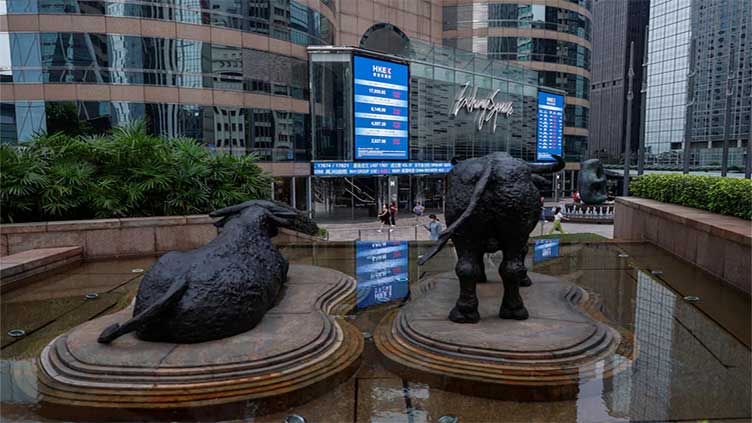Global shares march higher on Fed rate cut bets

Business
Europe, the STOXX 600 index rose 0.2% to its highest level since August 1
LONDON (Reuters) – European shares hit a 2-1/2 week high on Tuesday, tracking a Wall Street rally driven by expectations that the Federal Reserve could offer further hints of imminent rate cuts later this week.
With the data calendar relatively light across major economies this week, all eyes are on Wednesday's release of the Fed's July meeting minutes and Chair Jerome Powell's speech at Jackson Hole on Friday for clues on the outlook for US rates.
Fed policymakers have in recent days signalled a potential rate easing in September, priming markets for a similar tone from Powell and other speakers at the annual meeting of global central bankers and other policymakers in Jackson Hole, Wyoming.
"Should they acknowledge the US economy's disinflation path, it will confirm a September rate cut," said Thierry Wizman, global FX and rates strategist at Macquarie.
"Markets will likely turn on the extent to which Powell opens the door for the possibility of a 50 basis point (bps) cut at one of the next three FOMC meetings."
In Europe, the STOXX 600 index rose 0.2% to its highest level since August 1, having recovered all the losses seen after the weak US labour market report prompted worries about the state of the economy.
"Since the report, we've had number after number after number suggesting that a recession in the US economy is not around the corner," said Josephine Cetti, chief investment strategist at Nordea, citing strong US retail sales, upbeat business surveys, improving jobless claims numbers and a benign inflation reading.
"The recession fears have been dampened over the last couple of weeks and the market has rebounded a lot."
MSCI's broadest index of Asia-Pacific shares outside Japan hit a one-month high before giving up some gains to trade 0.3% higher.
Japan's Nikkei 225 hit its strongest level in over two weeks, closing up 1.8%, but Chinese blue-chips fell 0.7% on continued worries over the country's gloomy economic outlook. Hong Kong's Hang Seng Index edged down 0.5%.
US stock futures rose, with S&P 500 futures last up 0.1% while Nasdaq futures advanced 0.3%.
That left global stocks 0.1% higher, at their strongest level in over a month.
Expectations of a dovish Fed outcome this week left the dollar struggling at an over seven-month low against the euro, which peaked at $1.108775 on Tuesday. Sterling touched a one-month high and last bought $1.2995.
The dollar index was last at 101.84, having fallen to its lowest since early January of 101.76 earlier in the session.
Against the yen, the dollar was flat at 146.50 , with traders also looking to Bank of Japan (BOJ) Governor Kazuo Ueda's appearance in parliament on Friday, where he is set to discuss the central bank's decision last month to raise interest rates.
The BOJ's hawkish tilt had injected huge volatility into markets as investors aggressively unwound yen-funded carry trades, rocking stocks globally.
The market turmoil has since abated after BOJ Deputy Governor Shinichi Uchida earlier this month played down the chance of further rate hikes in the near term.
"With markets calming, Ueda may change tack and return to talking about normalising interest rates," said Joseph Capurso, head of international and sustainable economics at Commonwealth Bank of Australia.
Down Under, the Reserve Bank of Australia judged a near-term rate cut was unlikely and policy might need to stay restrictive for an "extended period" to ensure inflation can be tamed, minutes of the central bank's August meeting out on Tuesday showed.
That buoyed the Australian dollar slightly, though it was last 0.1% lower after hitting a one-month high earlier in the session.
In commodities, oil prices fell on easing worries about supply disruptions in the Middle East, with Brent crude last down 1% at $76.91 a barrel. US crude eased 1.2% to $73.50 per barrel.
Spot gold touched another record high of $2521.36 an ounce, drawing support from a broadly weaker dollar and on expectations of imminent US rate cuts.


